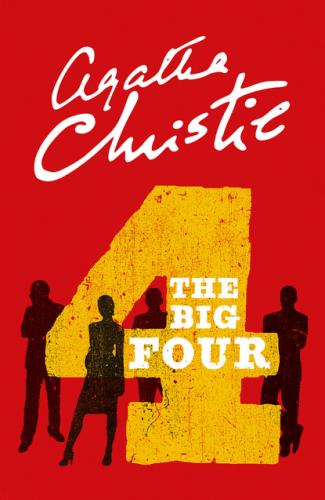The Big Four
Published by HarperCollinsPublishers Ltd
1 London Bridge Street
London SE1 9GF
First published in Great Britain by
Collins 1927
Agatha Christie® Poirot® The Big Four™
Copyright © 1927 Agatha Christie Limited. All rights reserved.
Cover design © HarperCollinsPublishers Ltd 2016
Title lettering by Ghost Design
Cover layout design © HarperCollinsPublishers Ltd 2016. Title lettering by Ghost Design. Cover photograph © Andrew Proudlove/Arcangel Images
Agatha Christie asserts the moral right to be identified as the author of this work.
A catalogue copy of this book is available from the British Library.
This novel is entirely a work of fiction. The names, characters and incidents portrayed in it are the work of the author’s imagination. Any resemblance to actual persons, living or dead, events or localities is entirely coincidental.
All rights reserved under International and Pan-American Copyright Conventions. By payment of the required fees, you have been granted the non-exclusive, non-transferable right to access and read the text of this e-book on screen. No part of this text may be reproduced, transmitted, down-loaded, decompiled, reverse engineered, or stored in or introduced into any information storage and retrieval system, in any form or by any means, whether electronic or mechanical, now known or hereinafter invented, without the express written permission of HarperCollins.
Source ISBN: 9780008164904
Ebook Edition © September 2016 ISBN: 9780007422166
Version: 2019-01-03
Contents
CHAPTER 1: The Unexpected Guest
CHAPTER 2: The Man From the Asylum
CHAPTER 3: We Hear More About LI Chang Yen
CHAPTER 4: The Importance of a Leg of Mutton
CHAPTER 5: Disappearance of a Scientist
CHAPTER 6: The Woman on the Stairs
CHAPTER 8: In the House of the Enemy
CHAPTER 9: The Yellow Jasmine Mystery
CHAPTER 10: We Investigate at Croftlands
CHAPTER 13: The Mouse Walks in
CHAPTER 14: The Peroxide Blonde
CHAPTER 15: The Terrible Catastrophe
CHAPTER 16: The Dying Chinaman
CHAPTER 17: Number Four Wins a Trick
CHAPTER 18: In the Felsenlabyrinth
I have met people who enjoy a channel crossing; men who can sit calmly in their deckchairs and, on arrival, wait until the boat is moored, then gather their belongings together without fuss and disembark. Personally, I can never manage this. From the moment I get on board I feel that the time is too short to settle down to anything. I move my suitcases from one spot to another, and if I go down to the saloon for a meal, I bolt my food with an uneasy feeling that the boat may arrive unexpectedly whilst I am below. Perhaps all this is merely a legacy from one’s short leaves in the war, when it seemed a matter of such importance to secure a place near the gangway, and to be amongst the first to disembark lest one should waste precious minutes of one’s three or five days’ leave.
On this particular July morning, as I stood by the rail and watched the white cliffs of Dover drawing nearer, I marvelled at the passengers who could sit calmly in their chairs and never even raise their eyes for the first sight of their native land. Yet perhaps
